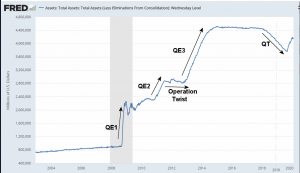It is widely held that a growing economy requires a growing money stock because economic growth increases demand for money. Many economists also believe that failing to accommodate the increase in the demand for money leads to a decline in consumer prices. This could destabilize the economy and produce an economic recession or even a depression. Some economists who follow Milton Friedman—also known as monetarists—want the central bank to target the money supply growth rate to a fixed percentage. They hold that if this percentage is maintained over a prolonged period, it will create economic stability. The idea that money must grow to support economic growth implies that money sustains … [Read more...]
How the FED Controls the Money Supply
When the government spends more money than it receives in taxes it has a “deficit” situation. In order to deal with this deficit, it engages in some fancy bookkeeping. The government is made up of a variety of agencies, so the other agencies request money from the Treasury Department. If it doesn’t have enough money the Treasury Department issues an IOU (called a Government Bond). The Treasury gives the Bond to the Federal Reserve (which is theoretically not part of the government). The FED writes a check to the Treasury for the bond. It then breaks up the bond into smaller bonds and sells them to individual banks. The banks then sell them to individual investors and groups of … [Read more...]
Inflation Rate Falls for April
The U.S. Bureau of Labor Statistics (BLS) released the monthly and annual Inflation numbers for April 2017. Annual inflation was 2.20% down from 2.38% in March, 2.74% in February, and 2.50% in January but above the 2.07% in December. Consumer Price Index (CPI-U) 244.524 up from 243.801 in March Monthly Inflation for April was 0.30% very close to February's 0.31% and similar to the average between March's 0.08% and January's 0.58%. Next release June 14th With Inflation falling almost 2/10ths of a percent and unemployment down one-tenth of a percent the Misery Index is down 3/10ths of a percent. The misery index helps … [Read more...]
Living in a Free-Lunch World
It seems that every once in a while, we awake from a deep sleep with what appears to us to be a brilliant revelation. Unfortunately, if we don't write them down they are usually forgotten by morning. Sometimes in the light of day they turn out to be totally ridiculous... but occasionally they actually do turn out to be a flash of inspiration. I had one such experience a few weeks ago. Of late I have been increasingly disturbed by the growing gulf between Liberals and Conservatives. It seems that they can't find any common ground and for all intents and purposes might be living on entirely different worlds. My revelation, although perhaps not earth-shattering, was to me at least … [Read more...]
Inflation and Your Retirement Nest Egg
Inflation has a big effect on the future value of our nest egg. As we begin to think about retirement we dream of our "magic number" that amount of money that we will need to retire comfortably. But with the rate of inflation constantly changing in is like trying to take aim at a moving target. To make matters worse it's not just the value of the money that is changing it is also the amount of interest you can earn on that money. With the FED actively working to keep interest rates low your savings often earn virtually "Nil" in the way of interest and to make matters even worse once inflation and taxes take their bite your nest egg might actually be shrinking. In today's article Dennis … [Read more...]
2 Types of Money
From the beginning, productivity improved with specialization. If one person can produce fruit more efficiently while the other was a better hunter, more wealth will be generated if the hunter hunts and the farmer farms. Forcing the farmer to hunt or the hunter to farm is just plain inefficient. But in order for the system to work there has to be a medium of exchange. Somehow the farmer has to be able to get the wild game in exchange for his crops. And what if the farmer wants meat but his crops aren't ripe yet? Well, that is how credit developed. In today's post Bill Bonner looks at mediums of exchange i.e. money and credit. He examines how they began and what they mean for us and our … [Read more...]
Deflation: First Step, Understand It
There is still time to prepare if deflation is indeed in our future. "Fed's Bullard Raises Specter of Japanese-Style Deflation," read a July 29 Washington Post headline. When the St. Louis Fed Chief speaks, people listen. Now that deflation -- something that EWI's president Robert Prechter has been warning about for several years -- is making mainstream news headlines, is it too late to prepare? It's not too late. There are still steps you can take if deflation is indeed in our future. The first step is to understand what it is. So we've put together a special, free, 60-page Club EWI resource, "The Guide to Understanding Deflation: Robert Prechter’s most important warnings about … [Read more...]
Gold is Still Money
The following article is excerpted from a brand-new eBook on gold and silver published by Robert Prechter, founder and CEO of the technical analysis and research firm Elliott Wave International. -- Tim McMahon, editor Bob Prechter: Gold is Still Money By Robert Prechter, CMT Have you ever traveled abroad and taken a look at the local currency and wondered how the citizens of that country could take seriously what looks like “Monopoly money?” I’ve got news for you: You’re using the same stuff. Monopoly money is the money over which some government has a monopoly. It is the currency of the realm only because the state makes it illegal to use any other type. … [Read more...]






